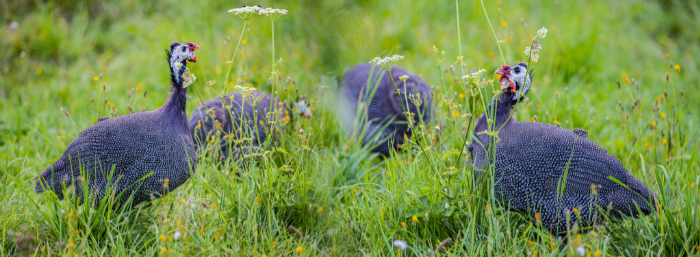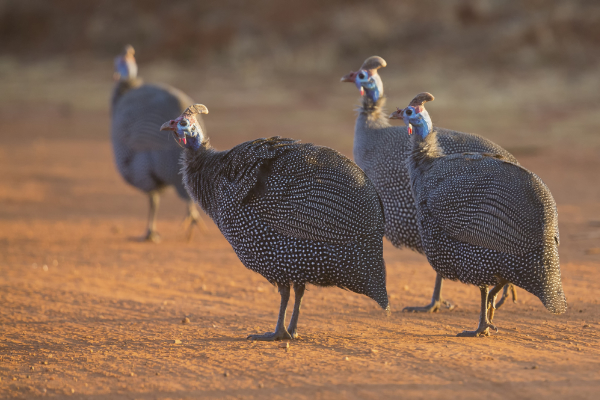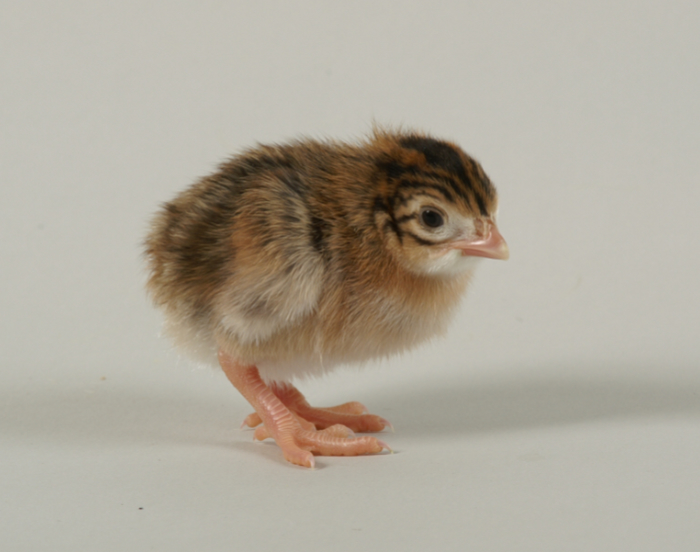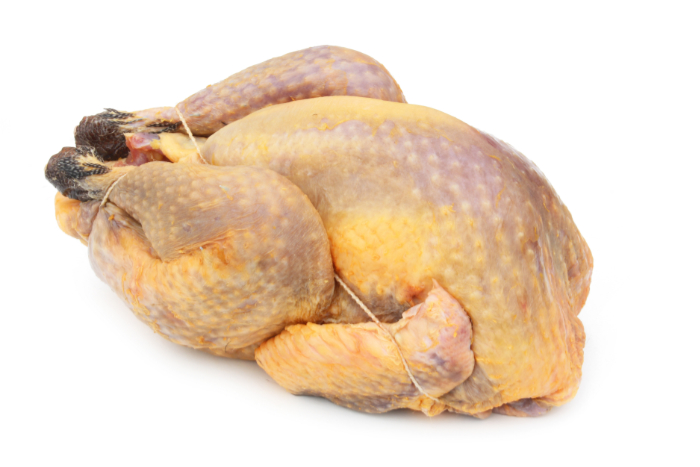Friday, August 28, 2020
Guineas are a wonderful addition to any flock or farm. They have some unique characteristics that are not shared with chickens, ducks or other poultry.

- They are probably the “wildest” bird in the poultry barnyard. Because of this they have retained an almost insatiable appetite for bugs and seeds. They patrol as a group from morning to night looking for those unfortunate bugs that crawl into the open or weed seeds scattered in your yard and garden. Most of the time they will not bother the plants in your garden. However, be careful that you do not feed them vegetable scraps from your garden as you brood your baby guineas. They might remember that as a tasty vegetable when they actually start working for you. But their voracious appetite for bugs, slugs and seeds is their most redeeming feature.
- Ticks are especially loved by guineas. So if you anticipate a problem with ticks, or have already experienced a problem with ticks, guineas can be an excellent weapon against them. Guineas typically range further than ducks and chickens looking for things to eat so your perimeter of defense against ticks is larger and further from your home and pens with guineas.
- Ticks are especially loved by guineas. So if you anticipate a problem with ticks, or have already experienced a problem with ticks, guineas can be an excellent weapon against them. Guineas typically range further than ducks and chickens looking for things to eat so your perimeter of defense against ticks is larger and further from your home and pens with guineas.

- Anyone that has been around guineas knows their loud cry when they are startled or bothered. They are the farmer’s version of the Neighborhood Watch. A different car pulling in the driveway? Alarm time! A hawk or owl in the sky? Alarm time! A skunk or possum prowling the henhouse? Alarm time! Don’t worry, if you have guineas, you will never be surprised by a two or four legged intruder.
- As was mentioned earlier, guineas are more “wild” than other poultry. They are a species of their own and originate in northern Africa. Hence their desire to wander far and wide on your farm. This is great until they decide to spend the night outside. As they are great fliers, they can easily roost in trees at night. The problem is that owls and climbing predators can pluck them off one at a time. Therefore, as with all other poultry, it is best to train them to come in every night to roost. When they are old enough to start exploring beyond their brooder into your yard, only allow one out a day. As they are a flock animal, it will not go far and will want to come home at night with the others. Do this for a week or two with only one bird let out at a time. Then let two or three out a day for several days. Gradually increase how many are let out daily until you can ultimately let them all out every morning and they will all come home in the evening. You can also trim their wings so they cannot fly. This will also make them easier to control.
- As was mentioned earlier, guineas are more “wild” than other poultry. They are a species of their own and originate in northern Africa. Hence their desire to wander far and wide on your farm. This is great until they decide to spend the night outside. As they are great fliers, they can easily roost in trees at night. The problem is that owls and climbing predators can pluck them off one at a time. Therefore, as with all other poultry, it is best to train them to come in every night to roost. When they are old enough to start exploring beyond their brooder into your yard, only allow one out a day. As they are a flock animal, it will not go far and will want to come home at night with the others. Do this for a week or two with only one bird let out at a time. Then let two or three out a day for several days. Gradually increase how many are let out daily until you can ultimately let them all out every morning and they will all come home in the evening. You can also trim their wings so they cannot fly. This will also make them easier to control.

- We hatch Pearl Guinea keets from February through October. Ordering is easy and typically we can get your keets to you within a couple weeks of your placing your order. Our minimum order is only six as we can use a heat pack to keep them warm from our hatchery to your home.
- Guineas are served in some of the most prestigious restaurants so don’t hesitate processing some of your guineas for your own dining room table. The chicks we sell are of Grimaud breeding in France and are the same ones grown commercially for meat throughout the world. The birds will grow to about four pounds live weight in twelve weeks (three pounds processed).
- Guineas are served in some of the most prestigious restaurants so don’t hesitate processing some of your guineas for your own dining room table. The chicks we sell are of Grimaud breeding in France and are the same ones grown commercially for meat throughout the world. The birds will grow to about four pounds live weight in twelve weeks (three pounds processed).

- You must use game bird or turkey starter and grower for your guineas as they require a higher protein level in their feed. But otherwise, you brood and grow them as you would ducklings, goslings or chicks.
- It is almost impossible to differentiate the sexes of guineas until they are several months of age. At that point the males begin to develop slightly larger waddles and helmets and stand a bit higher than the females with their longer legs.
- It is almost impossible to differentiate the sexes of guineas until they are several months of age. At that point the males begin to develop slightly larger waddles and helmets and stand a bit higher than the females with their longer legs.

- Guineas seldom scratch in the dirt so they rarely damage gardens. But they do enjoy on occasional dust bath. They are entertaining watching them patrol in groups looking for bugs. They are also much better fliers than chickens and will roost on roofs or in trees if you don’t clip their wings. Given enough room, they can co-exist with chickens, ducks and geese quite well.
Guineas are a great addition to almost any flock of poultry. Is now the time for you to add them to your flock?
Guineas are a great addition to almost any flock of poultry. Is now the time for you to add them to your flock?